Introduction
On February 6, 2013, Tunisians lost one of the leaders of the Tunisian Jasmine Revolution, when Tunisian secular and leftist opposition leader Chokri Belaid was gunned down in front of his home in El Menzah VI, a residential neighborhood in the capital Tunis.
Belaid was coordinator of the left-wing Tunisian Democratic Patriots' Movement, a political party that was established in 1981 but legalized only in 2011 following the Tunisian Revolution. He was a prominent critic of the El-Nahda party, which won a relative majority in the Tunisian elections in 2011, and of the rise of Salafist movements in the country.
Belaid's was not the first political murder. On October 18, 1012, Lotfi Naguedh, coordinator of the secular party Nidaa Tounes, was killed after being beaten by members of the League for the Protection of the Revolution (LPR), a group close to El-Nahda; he was attacked in his office in Tataouine. [1] Nidaa Tounes leader Beji Caid Essebsi called Naguedh's death a "political assassination."
At a February 1, 2013 El-Nahda Shoura Council meeting, El-Nahda members suggested that Naghuedh's killers should be freed.[2] A few days later, and the day before he was killed, Belaid said, during an appearance on a TV show on the North African channel Nessma TV, that by making this suggestion, El-Nahda had given a green light for political killings in the country.
Belaid, who lived in fear of assassination, had been threatened by the LPR,[3] which the Tunisian opposition considers to be El-Nahda's paramilitary armed wing.[4] It is thought by the opposition that the LPR is behind Belaid's assassination;[5] Belaid's widow, Besma Khalfaoui Belaid, has said that the she considers the El-Nahda party directly responsible for his death.[6]
On February 8, the Tunisian media outlet Kapitalis published a lengthy editorial, penned by Tunisian journalist Rachid Barnat, stating that stated that political responsibility for the assassination rests not only with El-Nahda but also with the ruling troika government comprising El-Nahda, the Congress for the Republic Party (CPR), and Ettakatol. The editorial accuses the troika of having done nothing to stop the rise of Islamism in the country, and states further that if the LPR is considered to be the militia of El-Nahda, then CPR leader and Tunisian President Moncef Marzouki can be considered to have flirted with the LPR – referring indirectly to a visit by an LPR delegation to Marzouki at his presidential palace in Carthage,[7] among other incidents.
The editorial also argues that the government has long since lost its political and moral legitimacy, since it was supposed to be transitional, formed with the aim of drawing up the Tunisian constitution in the aftermath of the revolution. The mandate of this government, he said, expired on October 23, 2012, a year after the election, and its extension makes it illegitimate.
Soon after Belaid's killing, El-Nahda PM Hamadi Jebali proposed the formation of an apolitical technocrat government. His party did not welcome the proposal, and the issue opened up a rift between Jebali and El-Nahda leader Rached Gannouchi.
Belaid's killing united Tunisians; 1.4 million[8] reportedly attended his funeral.
The following are excerpts from Barnat's op-ed, translated from the original French as published by Kapitalis:
"Some People Can Oppose Ideas And Freedom Only With Violence"
"Tunisia is mourning. It mourns a brave republican who fought for his ideas using as weapons only his intelligence and his force of conviction. He was shot in a cowardly manner for representing the conscience of this country, because some people can oppose ideas and freedom only with violence.
"Tunisia weeps. There is weeping everywhere, in every corner of the country and across the world: in Paris, Marseille, Toulouse, in Belgium, in Canada, and elsewhere.

Image circulated on Tunisian Facebook pages.
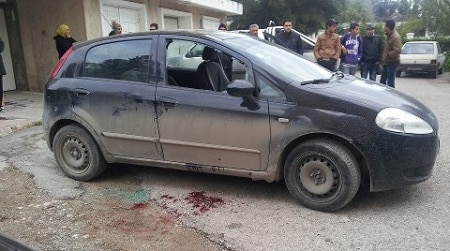
Scene of the attack on Chokri Belaid, near his home in Tunis[9]
"Tunisia grieves, and stands by Chokri Belaid's widow [Besma Khalfaoui Belaid] and her two daughters [Nayrouz and Nada]. His young innocent daughters, devastated by sorrow, do not yet understand what has happened. Only later, much later, when the mourning is over, will they and the entire country be proud of their father, who has entered the pantheon of brave men who died for an ideal...

Chokri Belaïd and his two daughters.[10]
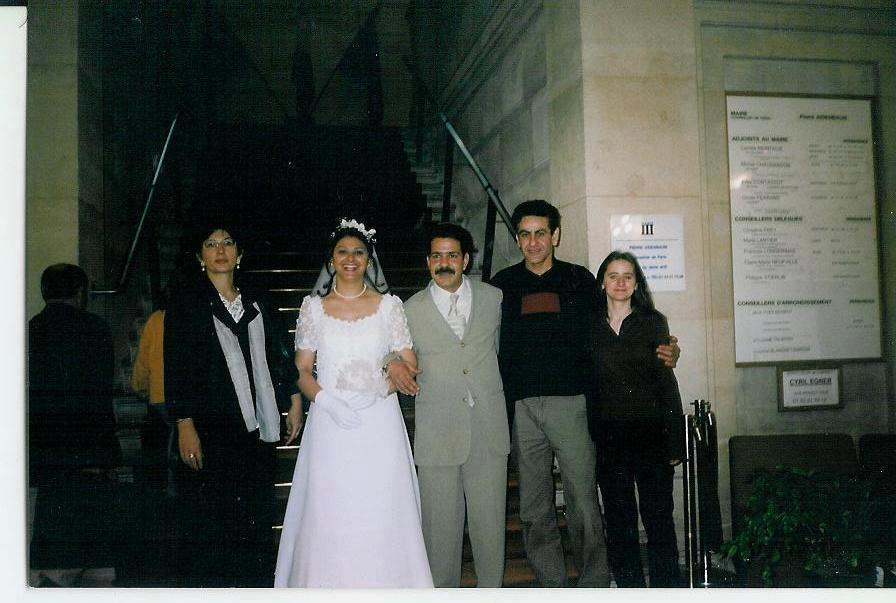
The Belaids' wedding.[11]

Belaid's widow, following the assassination.[12]
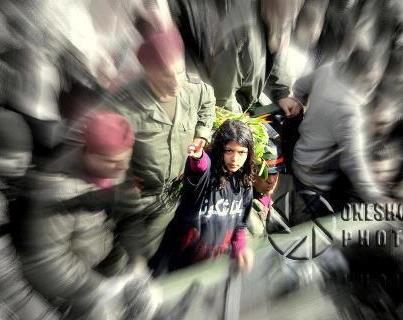
Belaid's daughter Nayrouz, on the day of her father's funeral. Her shirt reads, "Who killed my father?"[13]
"Chokri Belaid was assassinated by the same people he had defended against [former Tunisian dictator Zine Abidine] Ben Ali, and who, thanks to his struggle, were released from jail or allowed to return from exile and given the right of free speech... [But] they chose to deprive him of that same right – silencing him forever with their criminal and abominable act.
"We are still emotional, and that is normal. Emotion felt by an entire nation unites that nation. [El-Nahda leader Rached] Ghannouchi, with his Machiavellian strategy, has intentionally divided the Tunisians and pitted them against one another! Since this murder, they are united behind Chokri Belaid, more than ever before. They will all say: 'We are Chokri Belaid!'"
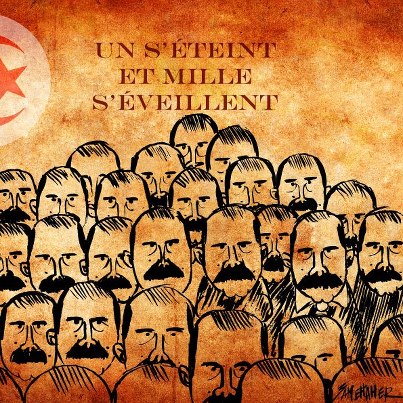
Image circulated on Tunisian Facebook pages: "One dies, one thousand awake"
"The Troika Is Responsible For This Crime!"
"But we must overcome this justifiable emotion and ask ourselves two very important questions: Who is responsible for this murder, and what must we do?
"When we talk of responsibility, we are not talking about those who actually carried out [the murder], the despicable people who opened fire. Those are just pathetic individuals – fanatics used by others, wretched mercenaries. The real culprits are those who gave the orders and created the toxic climate that made this happen!
"Please, refrain from talk about a [government] investigation […]. Let's spare the Tunisians the deception of a commission of inquiry – like the one established after the assassination of Lotfi Naguedh, or other inquiries into violent incidents, […] which have not been concluded to this day!
"We are talking of those politically responsible for this crime, and it is obvious who they are. The political responsibility falls upon those now in power – the Islamists who are ruling, starting with their leader Ghannouchi and his associates, including in the troika: [President Moncef] Marzouki and [Constituent Assembly President Mustapha] Ben Jaafar. The troika is responsible for this crime! [The troika] is accountable to the Tunisian people [for these crimes].
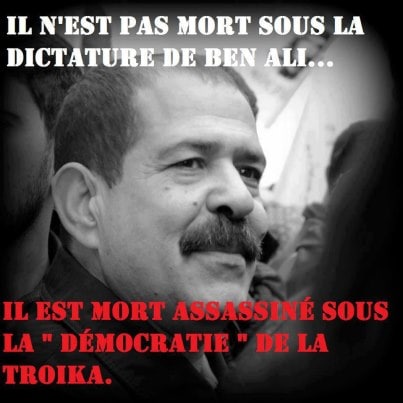
"He did not die under the Ben Ali dictatorship.... He was assassinated under the Troika 'democracy'"[14]

Belaid's funeral[15]

Image circulated on Tunisian Facebook pages: "Today, we counted 1.4 million at Djellaz [cemetery], attending Chokri Belaid's funeral"
"Let us analyze the [issue of political] responsibility [for this crime]. The first cause of this crime is the policy of the Islamists, who mixed religion into politics and forced on the Tunisians a way of practicing Islam that has been obsolete for many centuries – thereby injecting the population with the poison of division. They branded as 'good Muslims' [only] those who let themselves be colonized by obscurantists from Saudi Arabia and Qatar and by Bedouins from the Gulf, and as 'bad Muslims' all those who rejected this new politico-religious colonialism! The poison of mixing religion into politics is worse than any other cause of division, because the politicians who use it evoke God in their speeches and cause people to believe that they are speaking in the name of Allah.
"The second element of responsibility is that [the government] paved the way for the most backward, violent and regressive brand of Islam, namely Wahhabism – which the Tunisians had already rejected in the early 19th century – and also received with full honors preachers of hatred, and allowed them to distill their poison aimed at fostering dissent among the people. Isn't that true, Mr. Marzouki? Isn't this a major [reflection of your] responsibility?

Tunisian Salafis in the city of Sfax[16]
"But let's continue. This government has tolerated many calls for murder, especially by fanatic imams who still retain their positions unharassed. Is anything more detrimental to public order than a call for murder? [But] instead [of arresting these clerics, Interior Minister] Ali Larayedh preferred to arrest and charge artists, journalists, trade unionists, and teachers... for disrupting public order – when their only crime was to ask for reforms and for more freedom!
"Mr. Marzouki, isn't it true that this government has tolerated the League for the Protection of the Revolution (LPR), which is nothing but a fascist militia, which under the rule of law cannot be tolerated?
"This government has tolerated attacks on political gatherings, physical aggression against political figures, and destruction of mausoleums, and has taken no effective measures against these...
"How is it possible to not see [in all this] laxity – or worse, connivance that encourages crimes?
"How is possible, in such a climate, to avoid having some fanatics shoot a brave man?
"Yes, Ghannouchi and his double talk... Marzouki, Ben Jaafar and [PM Hamadi] Jebali: You are bear direct political responsibility for this crime, and History will attribute it to you.
"Let us remember what Ghannouchi used to say about 'Salafis' and about their activities: They're only kids, they're not from Mars, we need to be tolerant towards them because they are the bearers of culture and values! [But] attempts at murder and political assassination illustrate his considerations about Salafis, whose often-violent activism evokes his emotions and remind him of what he was like at their age!"
"If The Clearly Identifiable Culprits Had A Shred Of Dignity, They Would Resign"
"The shocking attitude of the interior minister, on February 6, in the [events that transpired during the] transport of the remains of the late lamented Chokri Belaid, at the height of Bourguiba Avenue, shows that he is totally unworthy of his position The cortege, followed by thousands of Tunisians crying their anger aloud, was harassed by Islamists – and, worst of all, the police of this state used tear gas against simple grieving bystanders, and against the ambulance that was being used as a hearse. Shame on them!
"Do you think that a government which has such a behavior should remain in power?

A man in a Tunisian flag suit in Tunis on February 6, the day of the assassination. Tunisians demonstrated against the assassination amid tear gas used by police.[17]

A Tunisian protester jumps to avoid tear gas fired by police to break up a rally outside the Interior Ministry following the assassination.[18]
"If the clearly identifiable culprits had a shred of dignity, they would resign, because they have failed. The most amazing thing is to hear the ministers of the Ghannouchi government telling us that they will take responsibility – thinking that with this word, they clear their consciences...
"[These events] should have led to the resignation of all the relevant ministers, if not [to the resignation of] the entire government, as happens in the democratic countries! And this should have happened long ago, because after every crisis that follows violent acts, there must be [some] resignations... But these gentlemen remain, chattering about responsibilities and legitimacy!...
"However, Tunisians do not believe in the dignity of these depressing figures. They must chase them out by themselves, because it is would be intolerable for the culprits in this crime to continue, in any way, to rule Tunisia. They are no longer worthy [of the posts they hold]."
The Government Has Lost Its Political and Moral Legitimacy
"All the keen forces in this country – civil society, and, first and foremost, the UGTT [the Tunisian General Labor Union] – must clearly say that it is no longer possible to continue with this rule, which as of October 23 2012 [when its mandate expired] has lost all juridical and political legitimacy, and has now lost its moral legitimacy.
"By the way, we can reproach the opposition and the UGTT for its failure to be adamant, on October 23, in demanding the recognition of the illegitimacy of the Constituent [Assembly] and of the powers deriving from it... Had they shown more resolve in demanding the end of the mandate, or had they at least firmly demanded respect for the conditions they proposed to the troika against an extension of their legitimacy... Chokri Belaid might still be alive today.
"Republicans of all stripes must join with civil society, in the framework of a dialogue yet to be defined, in order to create a government of National Unity – after first acknowledging the illegitimacy of the current rule, which has exceeded the time set for it the moment it was elected, which has missed its mission, and which, with this second crime against a political leader, has shown quite clearly its moral defeat.
"With regard to [PM] Jebali's decision to appoint a government of technocrats – this is simply surreal from a legal point of view. Who has the power to form a government, and who has the legitimacy to appoint a new government? There are still some lessons in law to be learned.

Tunisians dedicated Chokri Belaid Square.[19]
"It is only the Assembly that could still have the power to appoint a new prime minister and a government –but since October 23, this assembly has no juridical, political, or moral legitimacy. And we will repeat it endlessly: This assembly is no longer legitimacy. It was elected for the period of one year […] and had a specific task: to write the Constitution. We must acknowledge that this period has expired, and that [the assembly] has not fulfilled its mission. From where does it draw its legitimacy today?
"Furthermore, has this government succeeded in anything that might justify its legitimacy? Has it ensured political stability for this country? Has it managed to create stable institutions, which are the only guarantee of economic and social development? Has it ensured the security to property and to the people? To all these questions the answer is undoubtedly: NO!
"So, we must draw some conclusions concerning this illegitimacy, considering that it failed at all levels and in particular at the moral level. This assembly and its powers are totally discredited.
"They must leave!"
*A. Mahjar-Barducci is a research fellow at MEMRI
[1] AFP, November 5, 2012.
[2] Business News (Tunisia), February 4, 2013.
[3] France 2 (France), February 7, 2013
[4] Le Nouvel Observateur (France), February 6, 2013.
[5] Le Nouvel Observateur (France), February 6, 2013.
[8] Business News (Tunisia), February 8, 2013.
[9] Image: Webdo (Tunisia), February 6, 2013.
[10] Image: Kapitalis (Tunisia), February 8, 2013
[11] Image source: Nayrouz Belaid's Facebook page
[12] Image: "Tunisiens de France" Facebook page, February 12, 2013.
[13] Image: "Tunisiens de France" Facebook page, February 8, 2013.
[14] Image source: "Tunisiens de France" Facebook page, February 7, 2013.
[15] Image: Reuters, February 8, 2013.
[16] Image: "Centre Ville Sfax" Facebook page, February 6, 2013.
[17] Image source: RFI (France), May 20, 2012
[18] Image source: Facebook page Tunisiens de France; Photo credits: Touiti Fares, February 6, 2013
[19] Image source: AFP/Fethi Belaid, February 7, 2013.
[20] Image source: Kapitalis, February 8, 2013




